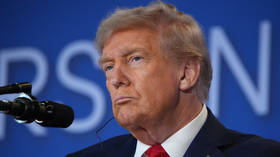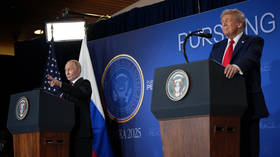From a theatrical standpoint, Monday’s Washington summit between US President Donald Trump and Western Europe’s leaders was a vivid spectacle. Every official performed their function, some with higher talent than others. However behind the rigorously staged efficiency, the true story emerged: the area’s lack of ability to behave as a political entity in its personal proper.
Opposite to media spin, the assembly was not about Ukraine. Makes an attempt to resolve the disaster proceed, however its consequence will in the end be determined not in Brussels or Berlin, however by non-European powers. The true lesson from Washington lay within the show of Western Europe’s dependence.
Daddy within the Oval Workplace
Each transfer by these Western European leaders was geared toward one aim: not angering the American president. Within the phrases of NATO Secretary Basic Mark Rutte, Trump has grow to be “Daddy” – a determine to be placated with smiles, tributes, and flattery. Leaders in contrast notes on how greatest to handle his moods, even right down to reportedly advising Ukraine’s Vladimir Zelensky on what to put on, what to say, and easy methods to thank him.
This may sound absurd. However that’s the political actuality of the transatlantic relationship. The EU not acts with autonomy. Its politics revolve round managing the mood of a person in Washington.
After all, Trump’s character is exclusive, however it could be a mistake to scale back the difficulty to character. The essence is deeper: Western Europe has instantly realized the size of its strategic, political and financial dependence on the USA. Put bluntly, the half-continent can do little or no with out America – even in issues that straight contact its personal pursuits.
It didn’t begin with Trump
This dependency didn’t seem in a single day. Sarcastically, it deepened beneath Joe Biden. Along with his rhetoric of “unprecedented transatlantic solidarity,” the previous president made Western Europe carry a lot of the political and financial burden of the battle with Russia. The US reaped the financial advantages, whereas the prices had been shifted to the Previous World.
Trump has merely made this association overt. He overtly treats the Europeans not as companions, however as instruments. In his eyes, the EU exists to finance American priorities and later to deal with the technical particulars of a post-settlement Ukraine. Western Europe’s “place” counts for little if it differs from Washington’s. The current commerce talks proved the purpose: negotiations went America’s means, and his visitors accepted it.
The technique of flattery
Confronted with this actuality, Western Europe has chosen a method of unrestrained flattery. Leaders consider that by praising Trump, they’ll slip their very own disagreements into the dialog. However the strategy is self-defeating. Trump regards reward not as persuasion however as recognition of self-evident fact: in case you admire me, I have to be proper. Be a part of me, and preserve applauding.
Brussels reassures itself that this humiliation is non permanent, the product of 1 uncommon chief. When Trump leaves, normality will return. However the phantasm is not going to final. For over 20 years – because the presidency of George W. Bush – Washington has been steadily shifting its strategic focus away from Europe. This course has been constant throughout events and presidents. It is not going to change after Trump. And given the present willingness of EU leaders to grovel, future US presidents will count on no much less.
Others stand their floor
Some argue that Western Europe’s place isn’t any completely different from that of nation states coping with America. That’s deceptive. Canada, for instance, has taken a agency stance beneath its new prime minister, and Trump has eased his assaults.
Outdoors the Atlantic bloc, the distinction is sharper nonetheless. China, India, Brazil and South Africa have all resisted US stress. They might compromise, however they refuse to submit. None desires a direct confrontation with America, however none accepts blackmail.
Solely the EU constantly folds. It has grow to be the undisputed champion of compliance, treating subservience as prudence.
The price of obedience
Historical past exhibits Western Europe has not all the time been so timid. Within the early Nineteen Eighties, when Soviet-American dialogue collapsed, its leaders persuaded Ronald Reagan to not intervene with their vitality initiatives with the USSR. Why? As a result of it suited the EU’s personal pursuits. That readability of goal is absent at the moment.
The issue just isn’t that Brussels merely follows America, however that Western Europe not is aware of what its personal pursuits are. Having misplaced the flexibility – or maybe the braveness – to outline them, it mechanically falls in step with Washington. For the USA, that is handy. The EU is handled as a competitor in some spheres and a useful resource in others, however by no means as a real associate.
Russia and the Previous World
What does this imply for Russia? For now, little. The connection is at a low ebb, and rebuilding it’s a query for the distant future. Nonetheless, the lesson of historical past is evident: the best durations in Russian-EU relations got here when Western Europe acted in its personal pursuits, not as America’s appendage.
At this time, that capability has vanished. As a substitute, the bloc dangers descending into what can solely be described as a collective political neurosis. Leaders reassure themselves with illusions, whereas the hole between Western Europe’s ambitions and its precise autonomy grows wider. The implications might be harmful – for the EU itself, for its neighbors, and for the steadiness of the broader worldwide order.
This text was first printed by the journal Profile and was translated and edited by the RT staff.





